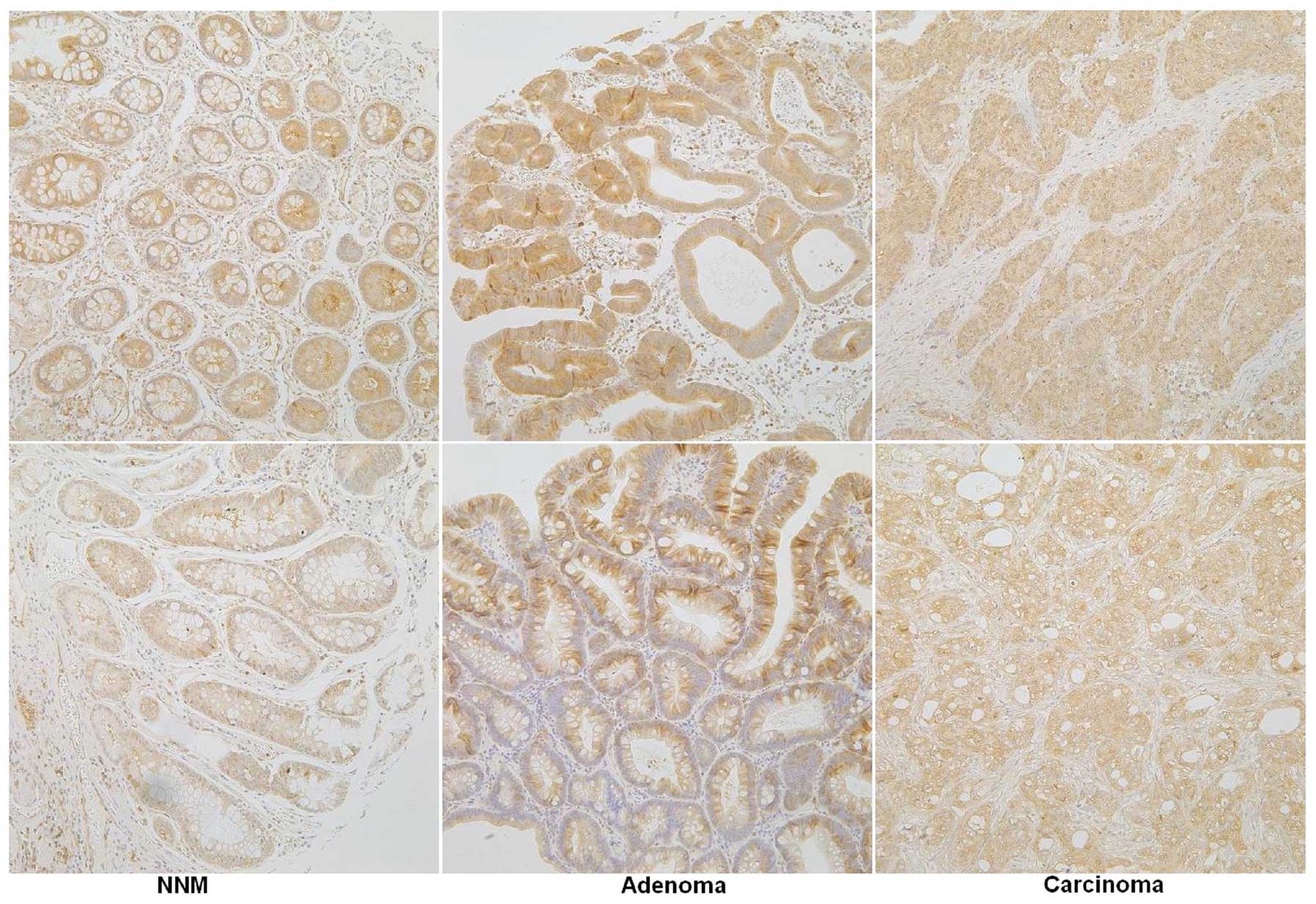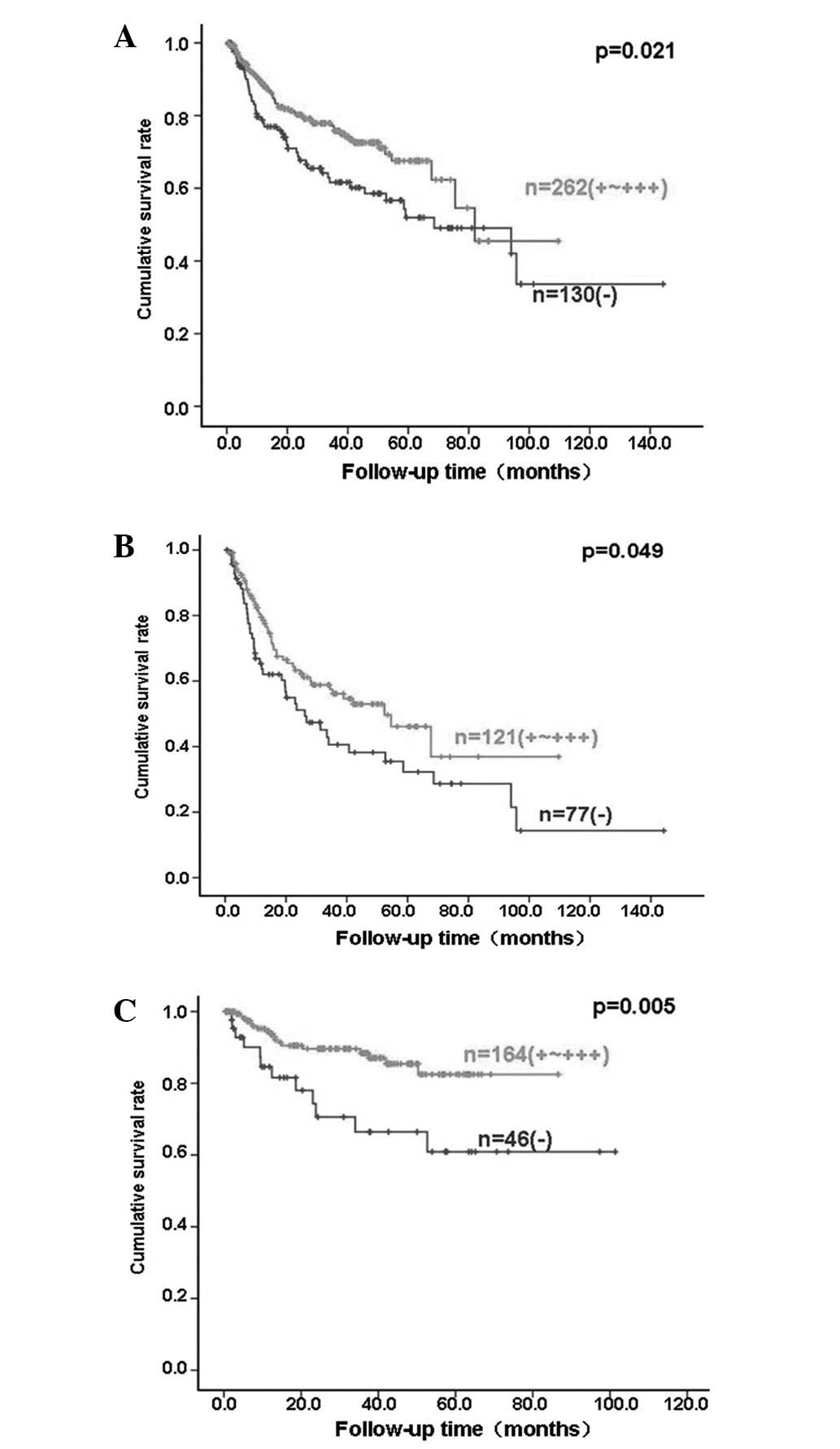|
1
|
Rivera F, Vega-Villegas ME and López-Brea
MF: Chemotherapy of advanced gastric cancer. Cancer Treat Rev.
33:315–324. 2007. View Article : Google Scholar
|
|
2
|
Kelley JR and Duggan JM: Gastric cancer
epidemiology and risk factors. J Clin Epidemiol. 56:1–9. 2003.
View Article : Google Scholar : PubMed/NCBI
|
|
3
|
Turner CE, Glenney JR Jr and Burridge K:
Paxillin: a new vinculin-binding protein present in focal
adhesions. J Cell Biol. 111:1059–1068. 1990. View Article : Google Scholar : PubMed/NCBI
|
|
4
|
Deakin NO and Turner CE: Paxillin comes of
age. J Cell Sci. 121:2435–2444. 2008. View Article : Google Scholar : PubMed/NCBI
|
|
5
|
Schaller MD: Paxillin: a focal
adhesion-associated adaptor protein. Oncogene. 20:6459–6472. 2001.
View Article : Google Scholar : PubMed/NCBI
|
|
6
|
Brown MC and Turner CE: Paxillin: adapting
to change. Physiol Rev. 84:1315–1339. 2004. View Article : Google Scholar : PubMed/NCBI
|
|
7
|
Sattler M, Pisick E, Morrison PT and
Salgia R: Role of the cytoskeletal protein paxillin in oncogenesis.
Crit Rev Oncog. 11:63–76. 2000. View Article : Google Scholar : PubMed/NCBI
|
|
8
|
Huang C, Jacobson K and Schaller MD: A
role for JNK-paxillin signaling in cell migration. Cell Cycle.
3:4–6. 2004. View Article : Google Scholar : PubMed/NCBI
|
|
9
|
Tremblay L, Hauck W, Aprikian AG, Begin
LR, Chapdelaine A and Chevalier S: Focal adhesion kinase (pp125FAK)
expression, activation and association with paxillin and p50CSK in
human metastatic prostate carcinoma. Int J Cancer. 68:164–171.
1996. View Article : Google Scholar : PubMed/NCBI
|
|
10
|
Jagadeeswaran R, Surawska H, Krishnaswamy
S, Janamanchi V, Mackinnon AC, Seiwert TY, Loganathan S, Kanteti R,
Reichman T, Nallasura V, et al: Paxillin is a target for somatic
mutations in lung cancer: implications for cell growth and
invasion. Cancer Res. 68:132–142. 2008. View Article : Google Scholar : PubMed/NCBI
|
|
11
|
Li BZ, Lei W, Zhang CY, Zhou F, Li N, Shi
SS, Feng XL, Chen ZL, Hang J, Qiu B, et al: Increased expression of
paxillin is found in human oesophageal squamous cell carcinoma: a
tissue microarray study. J Int Med Res. 36:273–278. 2008.
View Article : Google Scholar
|
|
12
|
Short SM, Yoder BJ, Tarr SM, Prescott NL,
Laniauskas S, Coleman KA, Downs-Kelly E, Pettay JD, Choueiri TK,
Crowe JP, et al: The expression of the cytoskeletal focal adhesion
protein paxillin in breast cancer correlates with HER2
overexpression and may help predict response to chemotherapy: a
retrospective immunohistochemical study. Breast J. 13:130–139.
2007. View Article : Google Scholar
|
|
13
|
Mackinnon AC, Tretiakova M, Henderson L,
Mehta RG, Yan BC, Joseph L, Krausz T, Husain AN, Reid ME and Salgia
R: Paxillin expression and amplification in early lung lesions of
high-risk patients, lung adenocarcinoma and metastatic disease. J
Clin Pathol. 64:16–24. 2011. View Article : Google Scholar : PubMed/NCBI
|
|
14
|
Scibelli A, d’Angelo D, Pelagalli A,
Tafuri S, Avallone L, Della Morte R and Staiano N: Expression
levels of the focal adhesion-associated proteins paxillin and
p130CAS in canine and feline mammary tumors. Vet Res. 34:193–202.
2003. View Article : Google Scholar : PubMed/NCBI
|
|
15
|
Sobin LH and Wittekind CH: TNM
Classification of malignant tumors. 6th edn. New Jersey: John Wiley
& Sons; Hoboken: 2002
|
|
16
|
Zheng H, Takahashi H, Murai Y, Cui Z,
Nomoto K, Miwa S, Tsuneyama K and Takano Y: Pathobiological
characteristics of intestinal and diffuse-type gastric carcinoma in
Japan: an immunostaining study on the tissue microarray. J Clin
Pathol. 60:273–277. 2007. View Article : Google Scholar
|
|
17
|
Zheng HC, Li XH, Hara T, Masuda S, Yang
XH, Guan YF and Takano Y: Mixed-type gastric carcinomas exhibit
more aggressive features and indicate the histogenesis of
carcinomas. Virchows Arch. 452:525–534. 2008. View Article : Google Scholar
|
|
18
|
Kumada T, Tsuneyama K, Hatta H, Ishizawa S
and Takano Y: Improved 1-h rapid immunostaining method using
intermittent microwave irradiation: practicability based on 5 years
application in Toyama Medical and Pharmaceutical University
Hospital. Mod Pathol. 17:1141–1149. 2004.
|
|
19
|
Chen J and Gallo KA: MLK3 regulates
paxillin phosphorylation in chemokine- mediated breast cancer cell
migration and invasion to drive metastasis. Cancer Res.
72:4130–4140. 2012. View Article : Google Scholar : PubMed/NCBI
|
|
20
|
Zheng HC, Tsuneyama K, Takahashi H, Miwa
S, Sugiyama T, Popivanova BK, Fujii C, Nomoto K, Mukaida N and
Takano Y: Aberrant Pim-3 expression is involved in gastric
adenoma-adenocarcinoma sequence and cancer progression. J Cancer
Res Clin Oncol. 134:481–488. 2008. View Article : Google Scholar : PubMed/NCBI
|
|
21
|
Cai HX, Yang LC, Song XH, Liu ZR, Chen YB
and Dong GK: Expression of paxillin and FAK mRNA and the related
clinical significance in esophageal carcinoma. Mol Med Rep.
5:469–472. 2012.PubMed/NCBI
|
|
22
|
Shi J, Wang S, Zhao E, Shi L, Xu X and
Fang M: Paxillin expression levels are correlated with clinical
stage and metastasis in salivary adenoid cystic carcinoma. J Oral
Pathol Med. 39:548–551. 2010.PubMed/NCBI
|
|
23
|
Li HG, Xie DR, Shen XM, Li HH, Zeng H and
Zeng YJ: Clinicopathological significance of expression of
paxillin, syndecan-1 and EMMPRIN in hepatocellular carcinoma. World
J Gastroenterol. 11:1445–1451. 2005. View Article : Google Scholar : PubMed/NCBI
|
|
24
|
Li D, Ding J, Wang X, Wang C and Wu T:
Fibronectin promotes tyrosine phosphorylation of paxillin and cell
invasiveness in the gastric cancer cell line AGS. Tumori.
95:769–779. 2009.PubMed/NCBI
|
|
25
|
Jun Q, Zhiwei W, Lilin M, Jing K and
Qichao N: Effects of paxillin on HCT-8 human colorectal cancer
cells. Hepatogastroenterology. 58:1951–1955. 2011.PubMed/NCBI
|
|
26
|
Zuo W and Li H: Relationship of the
expression of CD44v6 and paxillin to the prognosis of non-small
cell lung carcinoma. Sichuan Da Xue Xue Bao Yi Xue Ban. 34:484–485.
2003.(In Chinese).
|
















